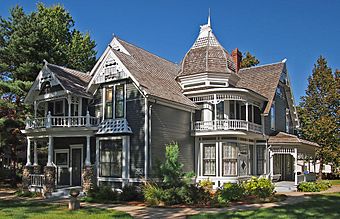Lund–Hoel House facts for kids
Quick facts for kids Lund–Hoel House |
|
|---|---|
|
John G. Lund House
|
|

The Lund–Hoel House from the south
|
|
| Location | 101 4th Street W, Canby, Minnesota |
| Area | .48 acres (0.19 ha) |
| Built | 1891, remodeled 1900 |
| Built by | H. Beiseker |
| Architectural style | Queen Anne |
| NRHP reference No. | 78001575 |
| Designated | October 2, 1978 |
The Lund–Hoel House is a special old house in Canby, Minnesota. Today, it's a museum where you can learn about the past. This house and its nearby carriage house were built in 1891. They belonged to John G. Lund, a very important person in the area.
John G. Lund was a person who bought and sold land. He was also a banker and a politician. In 1900, he made the house much bigger and changed its look. The house is now listed on the National Register of Historic Places. This means it's a very important building in American history. It was added to the list in 1978.
Contents
The Lund–Hoel House: A Historic Home
The Lund–Hoel House is known for its beautiful design. It is a great example of Queen Anne architecture. This style was popular in the late 1800s. It often features towers, turrets, and decorative details.
Who Was John G. Lund?
John G. Lund (1868–1908) played a big part in settling Yellow Medicine County. He helped many people move to the area. He also started several banks in the region. These banks helped people manage their money. John G. Lund even served as the mayor of Canby. A mayor is the leader of a city or town.
Why Is This House Important?
The Lund–Hoel House is important for two main reasons. First, it shows us what Queen Anne architecture looked like. It's a beautiful example of this building style. Second, it tells us about John G. Lund. He was a key figure in the early days of Canby and Yellow Medicine County. His work helped the area grow and develop.
See also



